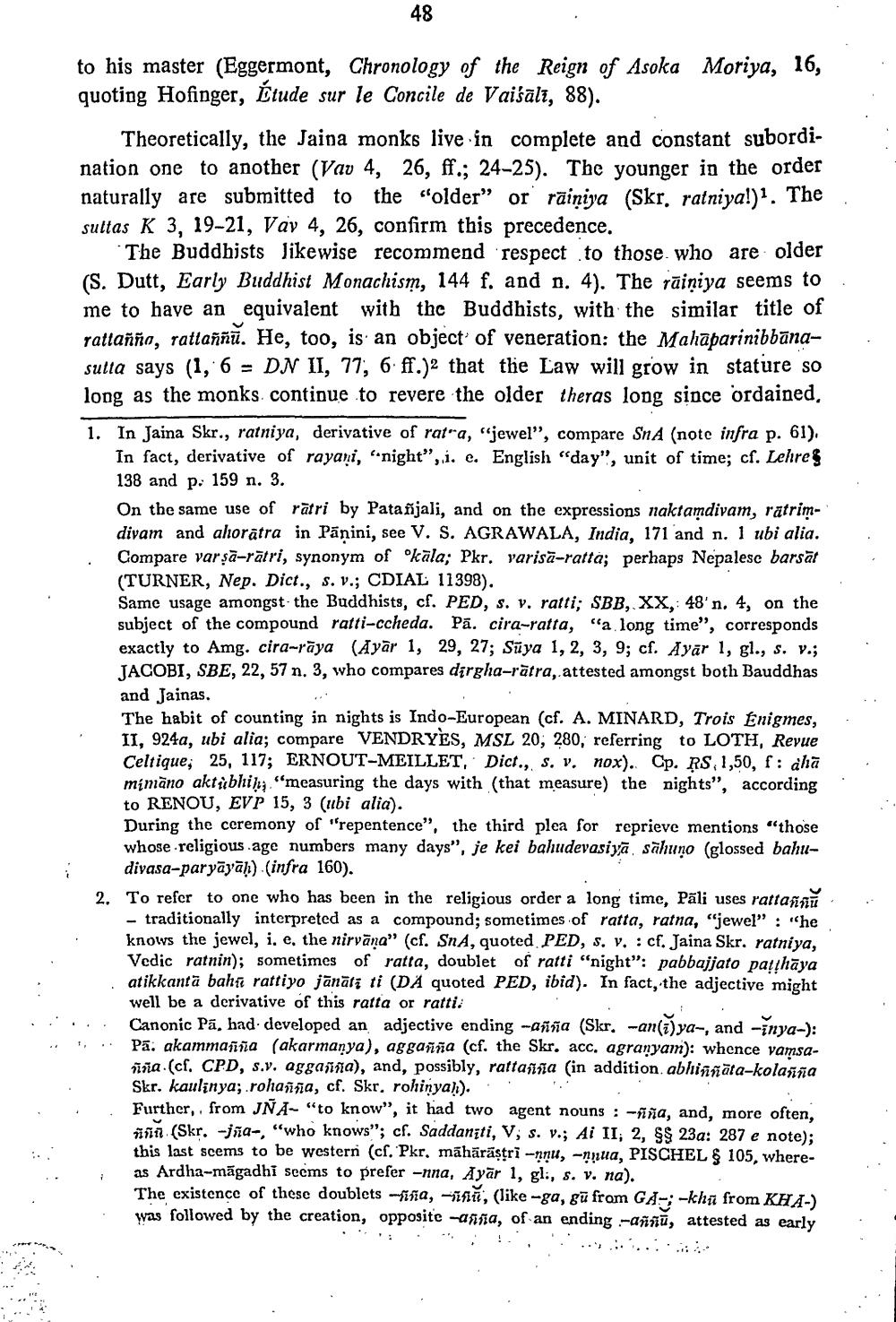________________
to his master (Eggermont, Chronology of the Reign of Asoka Moriya, 16, quoting Hofinger, Étude sur le Concile de Vaiśālī, 88).
Theoretically, the Jaina monks live in complete and constant subordination one to another (Vav 4, 26, ff.; 24-25). The younger in the order naturally are submitted to the "older" or rāiņiya (Skr. ratniya!)". The suttas K 3, 19-21, Vay 4, 26, confirm this precedence.
'The Buddhists likewise recommend respect to those who are older (S. Dutt, Early Buddhist Monachism, 144 f. and n. 4). The rāiniya seems to me to have an equivalent with the Buddhists, with the similar title of rattañño, rattaññū. He, too, is an object of veneration: the Mahaparinibbūnasutta says (1, 6 - DN II, 77, 6. ff.)2 that the Law will grow in stature so long as the monks. continue to revere the older theras long since ordained, 1. In Jaina Skr., ratniya, derivative of ratra, jewel", compare SnA (notc infra p. 61).
In fact, derivative of rayani, "night",.i. c. English "day", unit of time; cf. Lehres 138 and p: 159 n. 3. On the same use of rātri by Patañjali, and on the expressions naktamdivam, ratrimdivam and ahoratra in Panini, see V. S. AGRAWALA, India, 171 and n. 1 ubi alia. Compare var sā-rātri, synonym of 'kāla; Pkr. varisā-ratta; perhaps Nepalese barsāt (TURNER, Nep. Dict., s. v.; CDIAL 11398). Same usage amongst the Buddhists, cf. PED, s. y. ratti; SBB, XX, 48' n. 4, on the subject of the compound ratti-ccheda. Pā. cira-ratta, "a long time", corresponds exactly to Amg. cira-rāya (Ayār 1, 29, 27; Sūya 1, 2, 3, 9; cf. Ayar 1, gl., s. v.; JACOBI, SBE, 22, 57 n. 3, who compares dirgha-rātra, attested amongst both Bauddhas and Jainas. The habit of counting in nights is Indo-European (cf. A. MINARD, Trois Énigmes, II, 924a, ubi alia; compare VENDRYES, MSL 20, 280, referring to LOTH, Revue Celtique; 25, 117; ERNOUT-MEILLET, Dict., s. v. nox). Cp. RS, 1,50, f: ahā mimāno aktubhik."measuring the days with (that measure) the nights", according to RENOU, EVP 15, 3 (ubi alia). During the ceremony of "repentence", the third plea for reprieve mentions "those whose religious age numbers many days", je kei bahudevasiyā sāhuno (glossed bahu
divasa-paryāyāḥ) (infra 160). 2. To refer to one who has been in the religious order a long time, Pāli uses rattaññû.
- traditionally interpreted as a compound; sometimes of ratta, ratna, "jewel" : "he knows the jewel, i. e, the nirvana" (cf. Sna, quoted PED, s. v. : cf. Jaina Skr. ratniya, Vedic ratnin); sometimes of ratta, doublet of ratti "night": pabbajjato patthāya atikkanta baha rattiyo jānāti ti (DX quoted PED, ibid). In fact, the adjective might well be a derivative of this ratta or ratti. Canonic Pā, had developed an adjective ending -añña (Skr. -an(i)ya-, and -inya-): Pāakammajina (akarmanya), aggañña (cf. the Skr. acc. agranyam): whence vamsaina.(cf. CPD, s.v. agganna), and, possibly, rattanna (in addition. abhiññāta-kolansa Skr. kaulinya; rohania, cf. Skr, rohinya)).. . Further, from JNA- "to know", it had two agent nouns: -ñña, and, more often, inn (Skr. -jña-, "who knows"; cf. Saddanīti, V, s. V.; Ai II, 2, SS 23a: 287 e note); this last scems to be western (cf. Pkrmāhārāştri --nnu, -nnua, PISCHEL $ 105, whereas Ardha-māgadhi seems to prefer -nna, Ayar 1, gl., s. v. na). The existence of these doublets -iña, -fit, (like -ga, gü from GA--khu from KHA-) was followed by the creation, opposite -affia, of an ending -annū, attested as early




